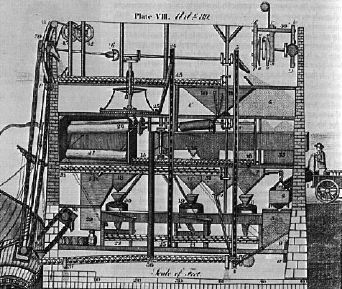Stages in the development
of complicated technical innovations:
 Postman argues that the development of technical expertise occurred in steps. Such a sequence was so powerful that each stage overwhelmed our perception and each step undermined subsequent effective responses to new technology. The increments occurred so swiftly and pervasively that we no longer effectively control tools and their applications.
Postman argues that the development of technical expertise occurred in steps. Such a sequence was so powerful that each stage overwhelmed our perception and each step undermined subsequent effective responses to new technology. The increments occurred so swiftly and pervasively that we no longer effectively control tools and their applications.
Compare Tables

Oliver
Evan's completely automated flour mill  1790s, Philadelphia, US. He
used a system of pulleys and Archimedean screws to move the grain from the wagon
unloaded on the right hand side. This obviated the need for any human hands
to touch the grain until it was turned into flour and bagged on the left. Once
packaged in a sack, the flour could be loaded on the awaiting ship, seen here
to the left of the mill. The spread of wheat and the consequent reduction in
flour prices encouraged the spread of the wheat planting belt from Pennsylvania
in the 1790s to the Prairies and Illinois in the 1830s.
1790s, Philadelphia, US. He
used a system of pulleys and Archimedean screws to move the grain from the wagon
unloaded on the right hand side. This obviated the need for any human hands
to touch the grain until it was turned into flour and bagged on the left. Once
packaged in a sack, the flour could be loaded on the awaiting ship, seen here
to the left of the mill. The spread of wheat and the consequent reduction in
flour prices encouraged the spread of the wheat planting belt from Pennsylvania
in the 1790s to the Prairies and Illinois in the 1830s.
Oliver Evans also constructed
a prototype steam engine, steam carriage and perfected the vacuum for refrigeration
before he opened the Mars iron works in Philadelphia. He died impoverished as
his inventions were far ahead of their times.

Postman's analysis
Thesis
Tools to Technocracy
Technocracy
From Technocracy to Technopoly
Technopoly
Broken Defenses
An improbable world
Invisible technologies
Scientism
warnings

Pursell | Pacey–Meaning | Pacey | Tenner | Postman–Tech | Postman–Television | Eberhart | Snow | Kaku

 Postman argues that the development of technical expertise occurred in steps. Such a sequence was so powerful that each stage overwhelmed our perception and each step undermined subsequent effective responses to new technology. The increments occurred so swiftly and pervasively that we no longer effectively control tools and their applications.
Postman argues that the development of technical expertise occurred in steps. Such a sequence was so powerful that each stage overwhelmed our perception and each step undermined subsequent effective responses to new technology. The increments occurred so swiftly and pervasively that we no longer effectively control tools and their applications.


